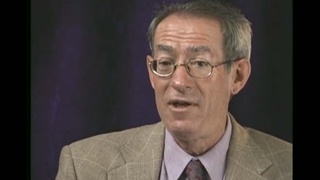Interviews
Life in camp as teenager
When we got into camp, I only went home to the barracks room when I had to go to sleep. And so, I remember…and I relied on the fact that the walls in the barracks between families only went up to the rafters, and it was open all the way through, so that you could hear the neighbors. So I relied upon that to do whatever I wanted to do. You know, my parents didn’t allow us to even play cards—any kind of cards—because it was associated with gambling. So I didn’t learn to play cards until I got into camp. And we didn’t even eat with our parents, you know, because it’s mess hall. So we ate with our peers. We played ball and that kind of stuff. And we’d stay up late and I learned how to play pinochle. And then I’d go home. And then one night my mother had enough of it. And she gave me a talking to that everybody could hear all up and down the barracks.
Date: January 7, 2004
Location: California, US
Interviewer: Art Hansen
Contributed by: Watase Media Arts Center, Japanese American National Museum.
Explore More Videos

Not recognizing father after reunion at Crystal City, Texas
(1937 - 2021) Teacher

A child's memories of activities at Crystal City, Texas
(1937 - 2021) Teacher

Hearing about Pearl Harbor
(b. 1921) Nisei veteran who served in the occupation of Japan




Traveling to Manzanar
(b. 1921) Nisei veteran who served in the occupation of Japan

Victory Corps Work during World War II
(1925 - 2018) Nisei educator from Hawai‘i

Jobs in Manzanar
(b. 1921) Nisei veteran who served in the occupation of Japan


Sugar beet and potato farming in Idaho
(b. 1921) Nisei veteran who served in the occupation of Japan

Recalling Pinedale and Tule Lake concentration camps
Judge, only Japanese American to serve on CWRIC.

On the Impact of the Camp Experience
(b. 1942) The first Asian American woman judge

A memorable CWRIC testimony of an unjust situation
Judge, only Japanese American to serve on CWRIC.

Being called out of Reserves
(b. 1921) Nisei veteran who served in the occupation of Japan
